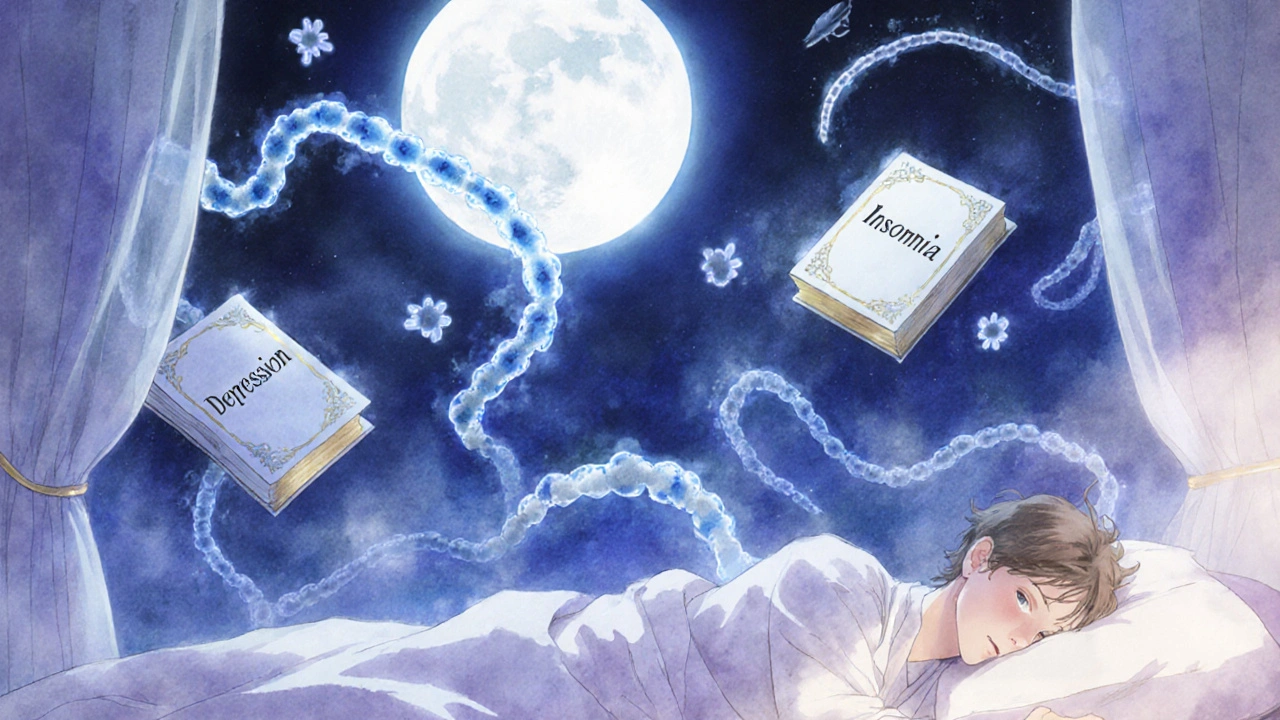
Trazodone is a medication most commonly prescribed for depression, but it’s also widely used off-label as a sleep aid. Unlike many sleep medications, it’s not a benzodiazepine or a sleeping pill in the traditional sense. Instead, it’s an antidepressant that happens to make people drowsy - and that’s why so many people take it at night. But knowing how it works, what it helps with, and what might go wrong is key to using it safely.
How Trazodone Works
Trazodone belongs to a class of drugs called serotonin modulators. It increases serotonin levels in the brain, which helps improve mood and regulate sleep cycles. Serotonin is a chemical your brain uses to send signals between nerve cells. Low serotonin is linked to both depression and insomnia. Trazodone doesn’t just block serotonin reuptake like SSRIs (such as sertraline or fluoxetine). It also blocks certain serotonin receptors, which is why it has such a strong sedative effect.
This dual action makes it different from most other antidepressants. While drugs like Lexapro or Prozac might keep you awake at night, trazodone often makes you sleepy within 30 to 60 minutes after taking it. That’s why doctors sometimes prescribe it for people who have trouble falling asleep - even if they don’t have depression.
Benefits of Trazodone
For people with major depressive disorder, trazodone can help lift mood, improve appetite, and restore energy over several weeks. But its most noticeable benefit for many users is sleep. Studies show that low doses of trazodone (25-100 mg) help people fall asleep faster and stay asleep longer. One 2021 review in the Journal of Clinical Sleep Medicine found that trazodone improved total sleep time by an average of 45 minutes per night in adults with insomnia.
It’s also used for anxiety-related sleep problems. People with PTSD, generalized anxiety, or even chronic pain often struggle to sleep. Trazodone can help calm racing thoughts and reduce nighttime awakenings. Unlike melatonin or over-the-counter sleep aids, it doesn’t cause dependence or tolerance in most users. That’s why many doctors prefer it over benzodiazepines like lorazepam or zolpidem for long-term use.
Another benefit? It’s cheap. Generic trazodone costs as little as $5 a month in the U.S. and under NZ$15 in New Zealand with a prescription. That makes it one of the most affordable options for sleep or depression treatment.
Common Side Effects
Like all medications, trazodone has side effects - and they’re usually mild. The most common ones include:
- Drowsiness (especially during the day if taken too late)
- Dizziness
- Headache
- Dry mouth
- Nausea
- Blurred vision
- Constipation
These usually go away after a few days or weeks as your body adjusts. Taking it with food can help reduce nausea. Drinking water helps with dry mouth. If dizziness is a problem, stand up slowly from sitting or lying down.
One unusual but real side effect is a condition called orthostatic hypotension - a sudden drop in blood pressure when standing. This can cause fainting, especially in older adults. If you feel lightheaded after standing, tell your doctor. They might lower your dose or suggest taking it earlier in the evening.
Less Common but Serious Side Effects
While rare, some side effects need immediate attention:
- priapism - a painful, prolonged erection lasting more than 4 hours. This can cause permanent damage if not treated. Seek emergency care if this happens.
- Severe dizziness or fainting
- Unusual bleeding or bruising
- Thoughts of suicide, especially in people under 25
- Allergic reactions like rash, swelling, or trouble breathing
Priapism is rare - occurring in less than 1 in 1,000 users - but it’s critical to know about. It’s more likely at higher doses (over 150 mg), but can happen even at 50 mg. If you’re prescribed trazodone, make sure someone in your household knows what to do if this happens.
Antidepressants, including trazodone, carry a black box warning from the FDA about increased risk of suicidal thoughts in young adults. This risk is highest in the first few weeks of treatment or after a dose change. If you or someone you know feels worse after starting trazodone, contact a doctor right away.
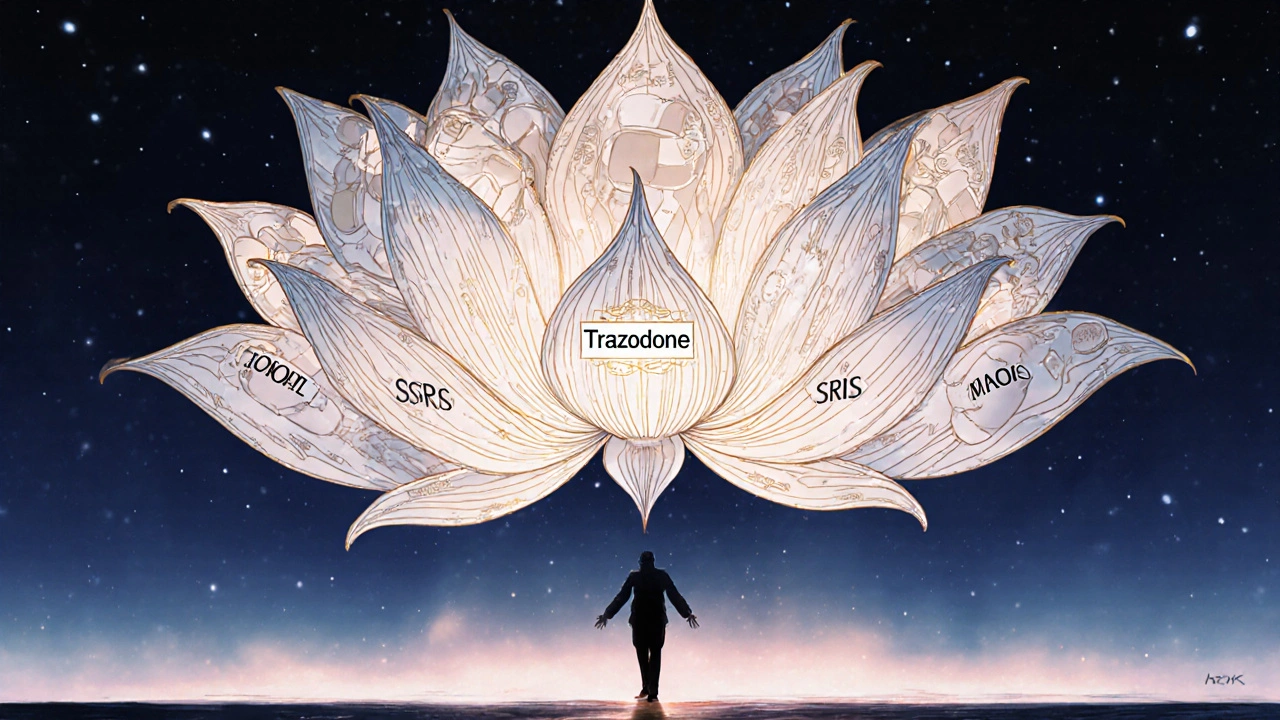
Who Should Avoid Trazodone
Trazodone isn’t right for everyone. Avoid it if you:
- Have had a heart attack in the last 30 days
- Have a history of priapism
- Are taking monoamine oxidase inhibitors (MAOIs) like phenelzine or selegiline
- Are allergic to trazodone or similar drugs
- Have liver disease - your body may not clear the drug properly
Also, if you’re over 65, your doctor should start you on a low dose (25-50 mg). Older adults are more sensitive to side effects like dizziness and confusion. Trazodone can increase the risk of falls in this group.
It’s also not recommended for children under 18 unless under strict supervision. While it’s sometimes used for autism-related insomnia in teens, there’s limited long-term safety data.
Dosage and Timing
For depression, doses usually start at 150 mg per day and may go up to 400 mg. But for sleep, most people take 25-100 mg at bedtime. Some doctors start as low as 10 mg for elderly patients or those sensitive to medications.
Timing matters. Take it within an hour of bedtime. If you take it too early, you might feel groggy the next morning. If you take it too late, you might not fall asleep because your body is already adjusting to wakefulness.
Don’t crush or chew extended-release tablets. Swallow them whole. And never stop trazodone suddenly. Even if you’re only taking it for sleep, your body can get used to it. Stopping abruptly might cause nausea, anxiety, or trouble sleeping for a few days. Taper down slowly under your doctor’s guidance.
Interactions with Other Drugs
Trazodone can interact with many common medications:
- Other antidepressants - mixing with SSRIs or SNRIs can cause serotonin syndrome (a dangerous condition with high fever, rapid heartbeat, confusion)
- Alcohol - increases drowsiness and dizziness
- Benzodiazepines (like Xanax) - can cause excessive sedation
- Blood pressure meds - may cause low blood pressure
- St. John’s Wort - can increase serotonin too much
If you’re on any other medication - even over-the-counter ones - tell your doctor before starting trazodone. Some herbal supplements and cold medicines can be risky.
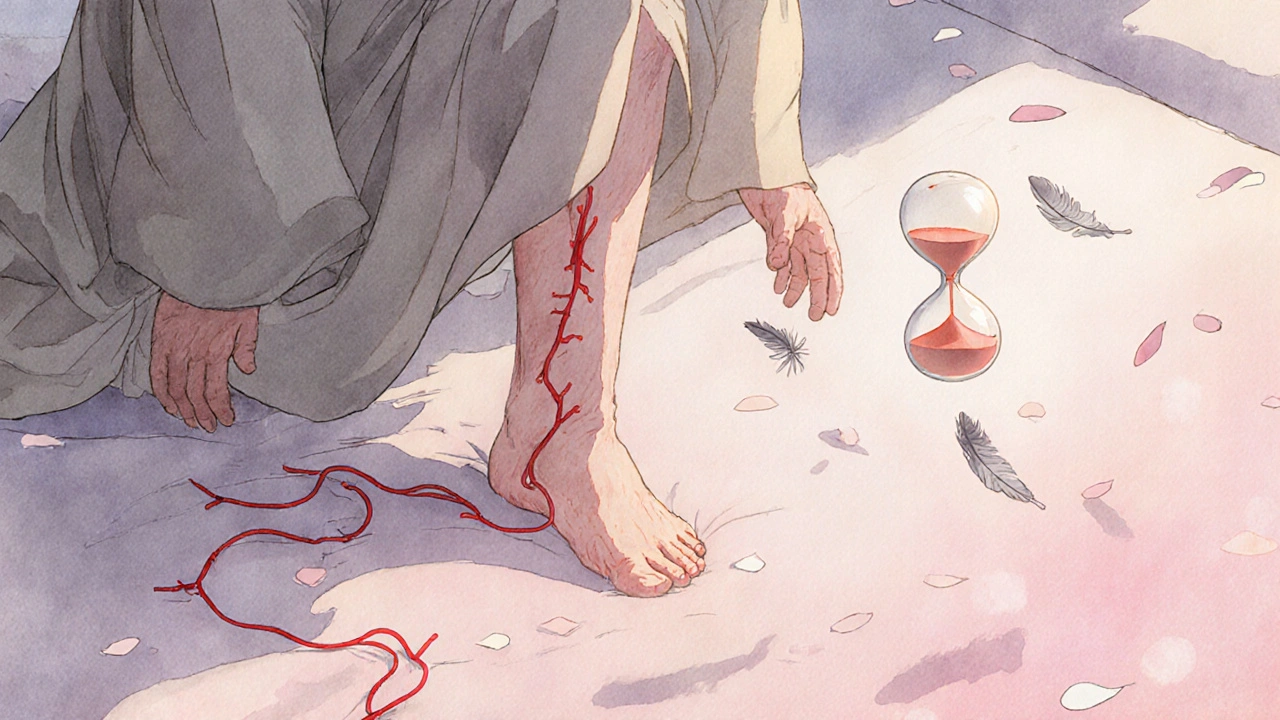
Is Trazodone Right for You?
Ask yourself these questions:
- Do I have trouble falling asleep, even when I’m tired?
- Have I tried non-drug methods like sleep hygiene, CBT-I, or reducing screen time before bed?
- Do I have depression or anxiety that’s making sleep worse?
- Am I okay with taking a medication that might make me drowsy the next day?
- Do I have a history of heart problems, liver issues, or priapism?
If you answered yes to the first three and no to the last two, trazodone might be a good fit. It’s not a cure-all, but for many, it’s a safe, affordable, and effective tool - especially when used short-term while building better sleep habits.
Many people use trazodone for a few months while learning cognitive behavioral therapy for insomnia (CBT-I). Once they’ve built new routines - like fixed bedtimes, no caffeine after 2 p.m., and a cool, dark room - they can often stop trazodone without rebound insomnia.
What to Expect When Starting
Don’t expect miracles on day one. Mood improvements take 2-4 weeks. Sleep might improve in 3-7 days. Keep a sleep journal for the first two weeks. Note when you go to bed, how long it takes to fall asleep, how many times you wake up, and how you feel in the morning.
Track side effects too. If dizziness is bad, note whether it happens when you stand up. If your mouth is dry, try sipping water before bed. Small changes can make a big difference.
Most people tolerate trazodone well. It’s not addictive. It doesn’t cause weight gain like some other antidepressants. And it doesn’t mess with your REM sleep the way benzodiazepines do.
But it’s not for everyone. If you’ve tried it and it didn’t help after 4 weeks, or if side effects are too much, talk to your doctor. There are other options - from melatonin to CBT-I to other sleep-friendly antidepressants like mirtazapine.
Can trazodone be used long-term for sleep?
Yes, many people take trazodone for months or even years for sleep, especially if they have chronic insomnia or depression. Unlike benzodiazepines, it doesn’t cause tolerance or withdrawal in most users. But it’s best used as part of a broader plan that includes sleep hygiene and behavioral therapy. Long-term use should be reviewed by your doctor every 6-12 months.
Does trazodone cause weight gain?
Unlike some antidepressants like amitriptyline or mirtazapine, trazodone is not strongly linked to weight gain. In fact, some people lose a little weight because it can reduce appetite. But everyone reacts differently. If you notice changes in weight, talk to your doctor - it could be due to improved mood or other factors.
Is trazodone addictive?
No, trazodone is not considered addictive. It doesn’t produce euphoria or cravings. You won’t need to increase your dose over time to get the same effect. However, your body can adapt to it, so stopping suddenly may cause mild withdrawal symptoms like rebound insomnia or nausea. Always taper off under medical supervision.
Can I drink alcohol while taking trazodone?
No. Alcohol makes trazodone’s sedative effects much stronger. This increases the risk of dizziness, fainting, falls, and even breathing problems. Mixing alcohol with trazodone can be dangerous, especially for older adults or those with liver issues. Avoid alcohol completely while taking this medication.
How long does trazodone take to work for sleep?
For sleep, most people notice improvement within 1-3 days. It works quickly because its sedative effect is immediate. But for depression, it can take 2-6 weeks to see full benefits. Don’t stop taking it just because sleep improved - if you’re taking it for depression, give it time to work fully.
Next Steps
If you’re considering trazodone, talk to your doctor about your sleep patterns, medical history, and other medications. Bring a list of everything you take - even vitamins and herbal supplements. Ask about non-drug options like CBT-I. If you’re already on trazodone and it’s working, keep track of how you feel. If side effects appear or it stops helping, don’t ignore it. Your doctor can adjust the dose or switch you to something else.
Trazodone isn’t a magic pill. But for millions of people struggling with sleep or depression, it’s a quiet, reliable tool that works - when used wisely.
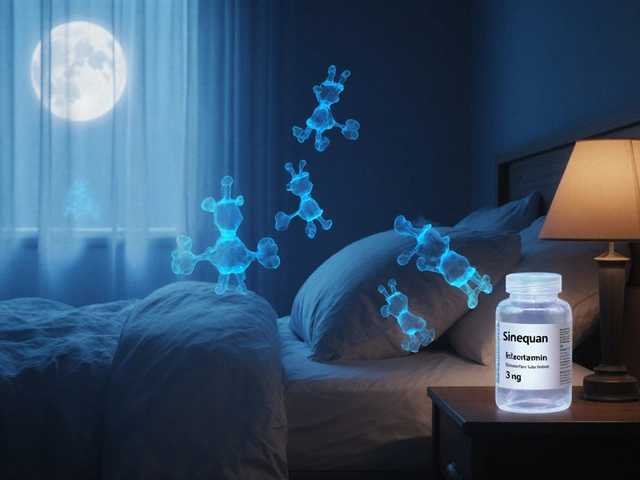
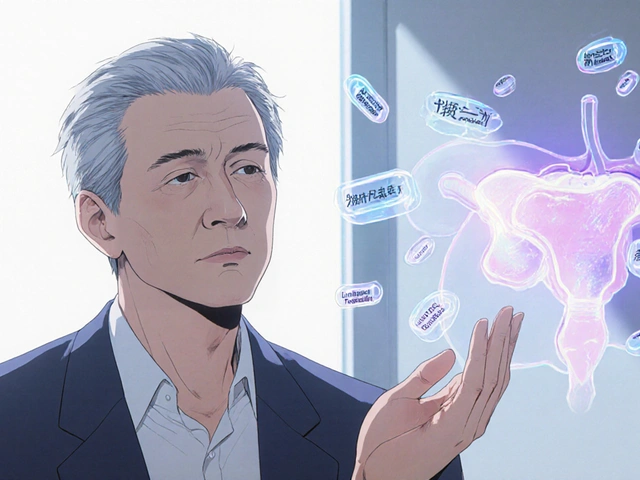
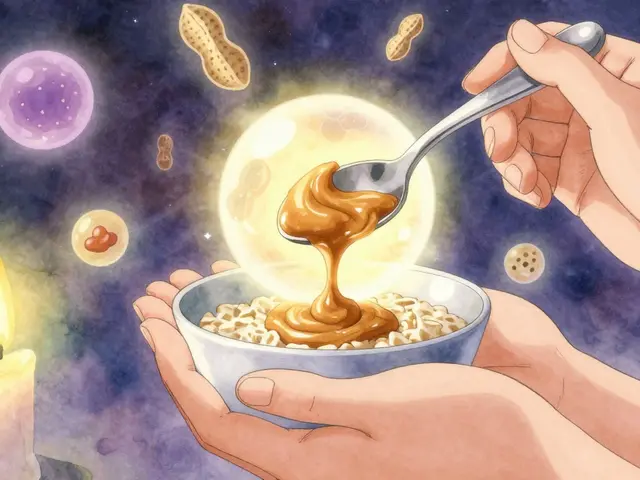
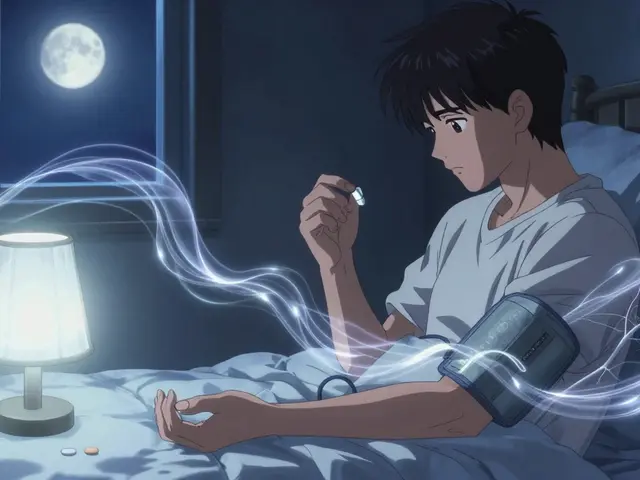

Ryan Masuga
November 5, 2025 AT 04:06man i started trazodone last month for sleep and wow it actually worked unlike that melatonin junk i was taking. fell asleep in 20 mins instead of 2 hours. no hangover either, just chill morning vibes. my doc said 50mg is the sweet spot for sleep. dont overthink it.
Jennifer Bedrosian
November 5, 2025 AT 06:03i took this for 3 weeks and woke up with a full on boner that lasted 6 hours. like i wasnt even dreaming. called 911. they said its rare but real. i dont take it anymore. also my mom said i was muttering about aliens in my sleep. sooo... yeah.
Lashonda Rene
November 6, 2025 AT 12:25i know a lot of people are scared of trazodone because of the priapism thing but honestly if you take it at the right time like right before bed and dont mix it with alcohol or other meds its pretty safe. i been on it for 2 years for anxiety sleep and depression and i feel way better. my doctor checks in every 6 months and we lower the dose slowly if i feel too groggy. its not perfect but its way better than counting sheep for hours
Andy Slack
November 8, 2025 AT 10:14just want to say if you’re struggling with sleep don’t give up. trazodone isn’t magic but it’s one of the few things that actually helps without being addictive. i used to be up till 4am scrolling. now i’m asleep by 11. small wins matter.
Rashmi Mohapatra
November 9, 2025 AT 00:12why are you all taking pills for sleep when you could just stop watching netflix before bed or drink chamomile tea like normal people. america is so medicated. i live in india and we dont need this. just sleep when tired. simple.
Abigail Chrisma
November 10, 2025 AT 04:45to rashmi: i get what you’re saying but not everyone has the same access to sleep hygiene or mental health resources. for some of us, trazodone is the bridge to getting 6 hours of rest so we can show up for our kids, jobs, or recovery. it’s not about laziness, it’s about survival.
Ankit Yadav
November 10, 2025 AT 08:09agree with abigail. also trazodone helped me get through my divorce when i couldnt sleep for weeks. no euphoria no cravings just quiet rest. i tapered off after 8 months and slept fine. its a tool not a crutch. dont shame people using it responsibly
Meghan Rose
November 11, 2025 AT 12:54ok but did you read the part about serotonin syndrome? because i took this with a little zoloft and nearly died. my heart was racing and i thought i was having a stroke. your doctor probably didn’t tell you that. just saying. dont be that guy who thinks it’s harmless because it’s cheap
Steve Phillips
November 12, 2025 AT 12:23Let me just say, as someone who has read the full FDA label, the black box warning, the pharmacokinetic data, AND the 2021 Journal of Clinical Sleep Medicine meta-analysis - trazodone is not "safe," it’s not "simple," and it’s not "affordable" if you factor in the ER visits, the priapism lawsuits, the orthostatic hypotension falls, and the fact that 40% of users report next-day cognitive fog. This isn’t a wellness hack - it’s a pharmacological compromise disguised as a solution. If you’re taking this for sleep, you’re not fixing your sleep - you’re just sedating your nervous system until your body gives up. Please. Stop glorifying this. CBT-I is free. And it works.